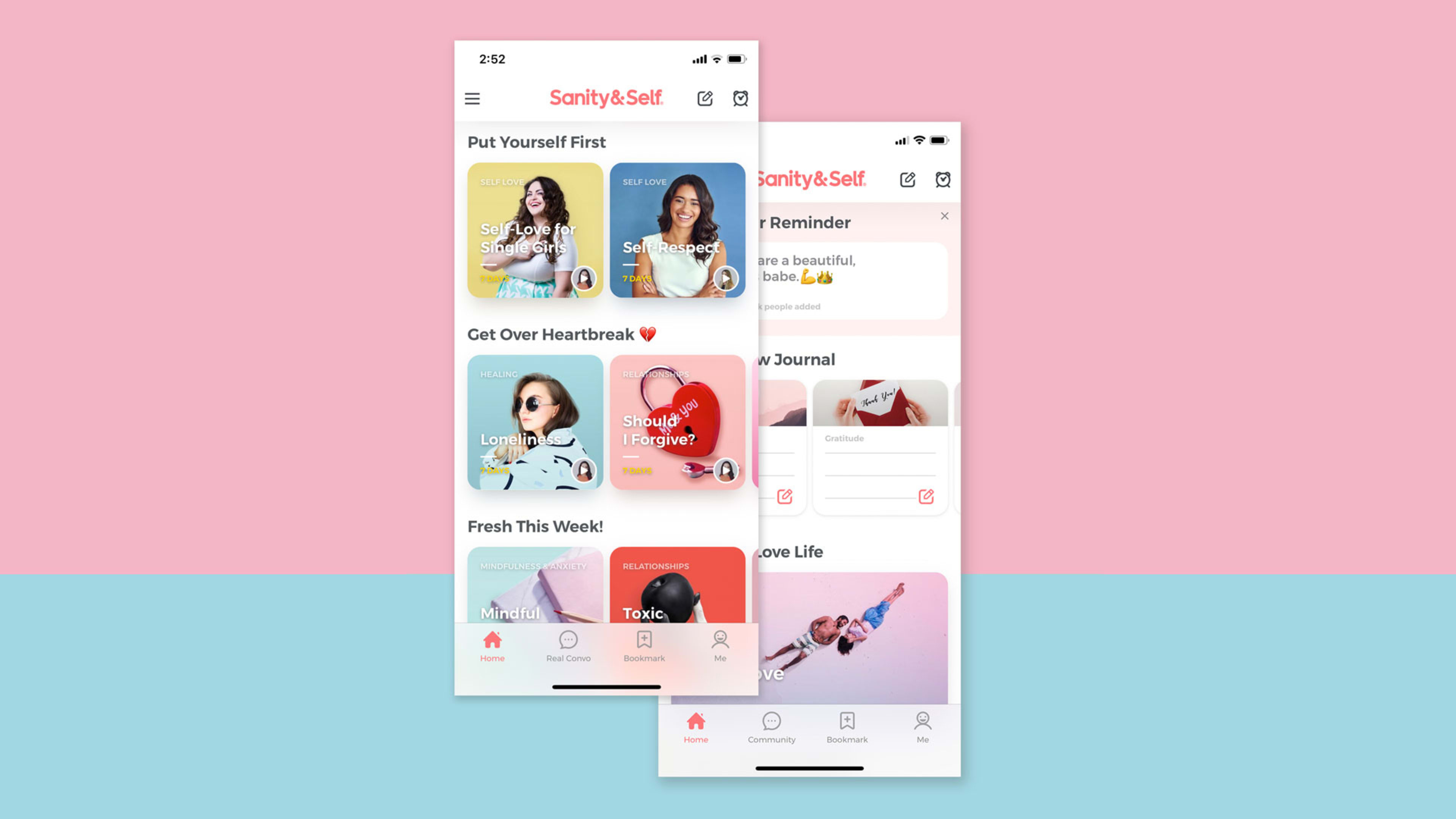Self-care app Sanity & Self welcomes new users with a 10-minute meditation titled “give less f#cks, live more life.” Over a slow piano ballad, a relaxing female voice encourages listeners to do two specific things: Stop apologizing and start enforcing boundaries.
“How much of your day do you spend doing things you don’t want to do?” beckons the soothing narrator. “Not giving a f*ck means you are not going to be responsible for other people’s emotional experiences . . . That’s power.”
Over one million people from over 100 countries now use the female-focused Sanity & Self for a daily dose of mindfulness at $4.99 a month (with an annual subscription). They are drawn to the app’s 900+ audio tracks that are simultaneously sympathetic and empowering, tackling issues like housework and relationship issues. Categories include self-esteem (“you are lovable”), heartbreak (“get over your ex”), and even sexual frustration (“have orgasm anxiety?”). The app boasts nearly 7,500 user reviews.
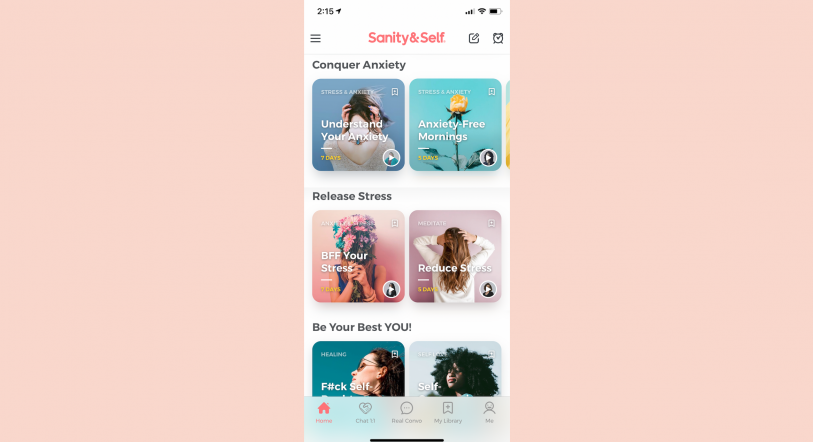
“There’s a lot of self-care that’s one-size-fits-all, and I feel that’s not realistic,” says Meng Li, who cofounded Sanity & Self with former Apple engineer Nikola Hu in 2018. “Similarly, it’s not like one medication pill cures all people.”
‘Something was missing’
Li, 37, recalls hitting her personal “rock bottom” two years ago. At the time, she ran the wearable wellness startup Moov and had just welcomed her first child. Overwhelmed, Li often found herself crying on the way to work. “I was just so stressed,” recalls Li. “But I didn’t even know how to take care of my inner self. Something was missing.”

Numerous studies attest to pressures affecting American women: A 2018 report found women do double the emotional labor of men; a Michigan State University study concluded women multitask 10 hours more per week than men, while the Anxiety Disorders Association of America discovered that American women are twice as likely as men to suffer from anxiety.
The most popular category on Sanity & Self is Relationships, which includes lessons on everything from moving in with a partner, to how to stop dating narcissists. It’s followed by Self Love (self-esteem issues) and Empowerment (with the leading topic focused on fear of being alone). Members skew millennial, but a growing percentage are Gen Z-ers, many of whom gravitate toward content on how to be more confident.
Millennials’ complicated relationship with self-esteem is what drew British entrepreneur Poppy Jamie, 29, to launch mindfulness app Happy Not Perfect in 2017. Two years earlier, Jamie had hosted Snapchat’s first chat show, Pillow Talk with Poppy, where she heard from countless young women overwhelmed by modern life. Inundated with perfect social media influencers, many felt insecure and, well, imperfect.
“We can’t help but be affected culturally by the images we see day in, day out,” says Jamie, who says she’s also been affected by what she describes as “toxic” social media pressures.
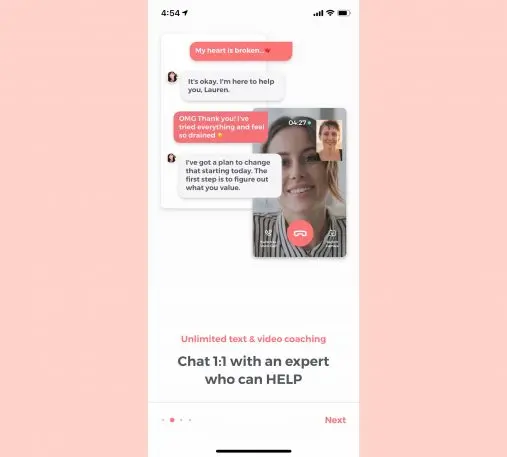
Jamie devised Happy Not Perfect’s signature offering, “The Happiness Workout,” a five-minute meditation for time-strapped millennials. Users pick one of dozens of applicable moods (overworked, ignored, jealous, spiraling, etc.) before starting a guided interactive ritual that spans breathing instructions, visual aids, free-based drawing, and a gratitude journal. The app is free to download, though full guided meditations cost $9.99 a month.
The majority of Happy Not Perfect users are 25 to 35, with the second biggest demographic 14 to 25. Members focus on self-love, compassion, and self-esteem, with the biggest issues centering on burnout and stress—either in school or the workplace—followed by appearance anxiety and body dysmorphia. The third revolves around finding a purpose.
Today, Happy Not Perfect partners with brands such as Victoria’s Secret Pink, Bumble, and Saks. In the coming year, the startup intends, much like Sanity & Self, to place bigger emphasis on a growing clientele: moms. Jamie notes that young parents are especially drawn to the app’s quick, five-minute meditation.

Mindfulness for moms
Many in the mindfulness industry have turned their attention to motherhood recently. Three-year-old pregnancy meditation and sleep app Expectful ($9.99 per month) saw a 200% increase in the past 12 months. Expectful creates customized audio for women going through all stages of pregnancy and postpartum. There’s a meditation for every week of pregnancy and even for the fertility process.
Mark Krassner, 33, founded Expectful upon noticing a gap between pre- and postnatal care for mental health. He points to several studies on how a pregnant person’s stress and depression levels affect the fetus. Some doctors suggest that emotional well-being is really just as important as nutrition during pregnancy.
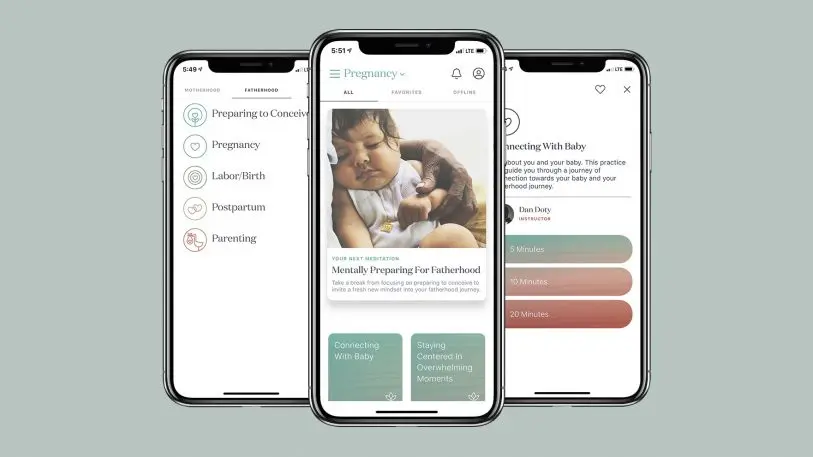
“We want to make meditation as common as prenatal vitamins,” says Krassner. “One of the ways we can do that is by promoting science and conducting this research.”
First-trimester tracks discuss specific challenges such as morning sickness, while second- and third-trimester content focuses on connecting with the baby. Expectful also adds little posture exercises to accommodate a member’s growing body. Should a member experience a miscarriage—one in five pregnancies end in a loss—Expectful offers a meditation program created by bereavement counselors.
Krassner believes women are more likely to use a niche app like Expectful and be consistent with their practice because the meditations are completely contextualized to their experience. “We speak to their very unique challenges,” says Kassner.
Meanwhile, The Dream Birth Company offers meditation audio tracks and teleconference courses for pregnant women preparing for labor. The San Francisco-based agency helps clients envision the mind-body birth connection in more holistic terms. (Contractions, for example, are instead called “waves.”)
“People have all these preconceived ideas on how birth can be painful and traumatic,” says cofounder Clodagh Connell, 31. “We rewire your brain to see birth as something quite logical, natural.”
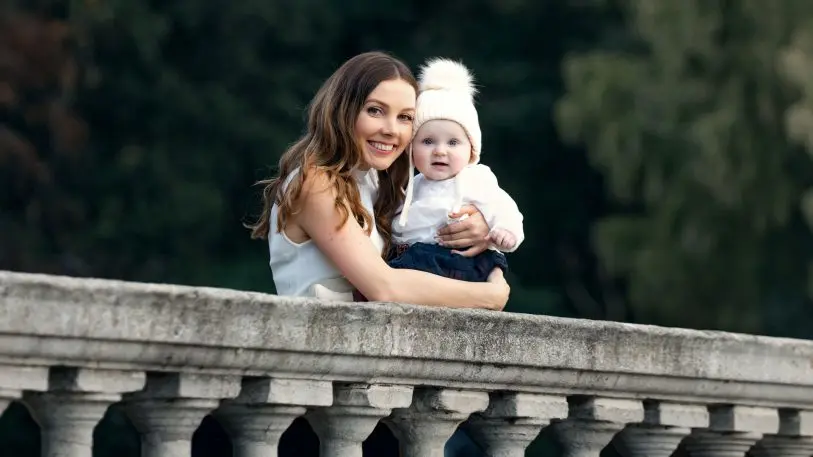
More than meditation?
But for all the hype and research debate on the efficacy of mindfulness, some criticize the practice as self-pacification that merely skims the underlying issues at hand. In his new book, McMindfulness: How Mindfulness Became the New Capitalist Spirituality, author Ron Purser bemoans the modern and solo interpretation of mindfulness, divorced from its more community-centric beginnings. People need social support, he argues, not to be told to sit silently and block out anxiety.
That’s an issue Li felt acutely during her mental crisis. As she explains, “I can’t meditate my problems away.” Similarly, Jamie recalls people simply parroting the mantra “just meditate” whenever she was having a tough time.
To that end, Sanity & Self offers more than just meditation audio. The app also includes message boards on topics ranging from “how to make friends with other females” to “what to do when your husband falls out of love.” In addition, a premiere $39.99-per-week membership includes access to one-on-one chats with a licensed therapist, life coach, or relationship expert.
Li finds the communal aspect a crucial accompaniment to guided meditation. With the community centered around women, she explains, members get to feel more comfortable in discussing taboo or embarrassing topics they might feel too ashamed to address with their friends—or share in more broad digital communities. “Vulnerability is so important, but in order to be vulnerable, we have to create a safe environment for women,” says Li.

As Jamie attests, traditional meditation isn’t the be-all and end-all—and it often takes years to cultivate. Happy Not Perfect doesn’t pretend to solve all of one’s problems, she says. It offers a quick fix to handle escalating emotions, “so we can return to our rest and relaxed state, enabling us to make better decisions from a calmer state,” explains Jamie.
“Mindfulness does work,” says Connell. “It’s just the way it’s delivered—it needed to be totally rebranded.”
Recognize your brand’s excellence by applying to this year’s Brands That Matter Awards before the early-rate deadline, May 3.
